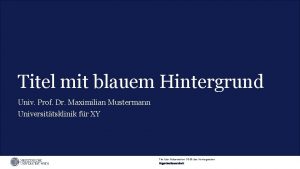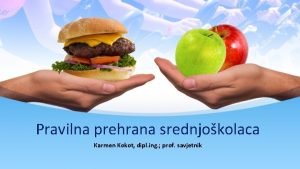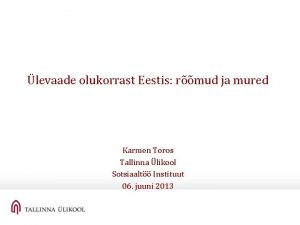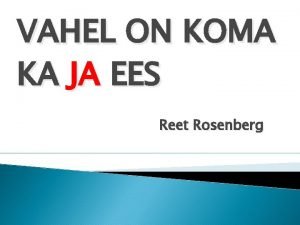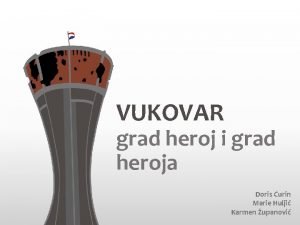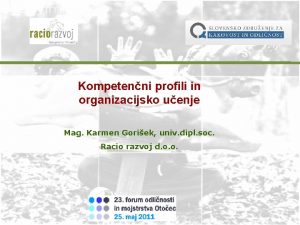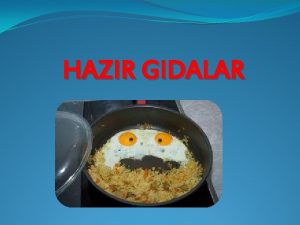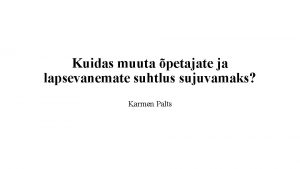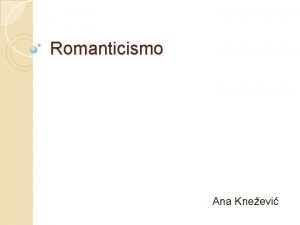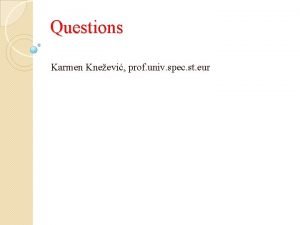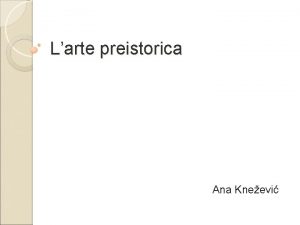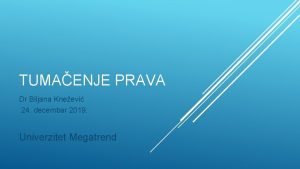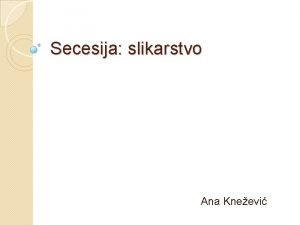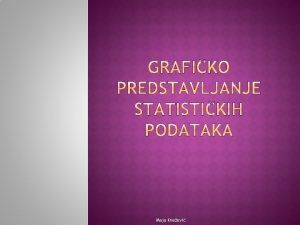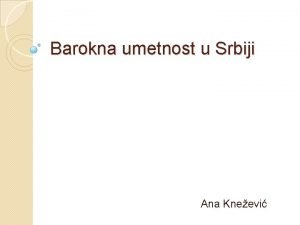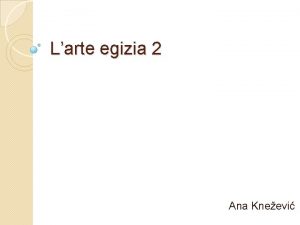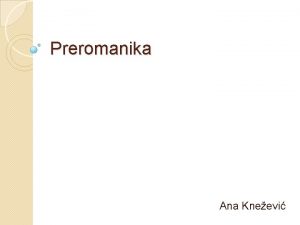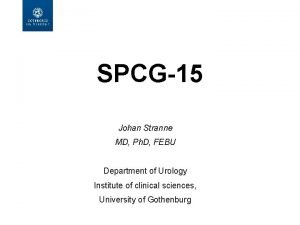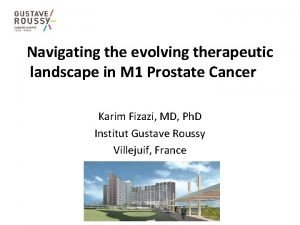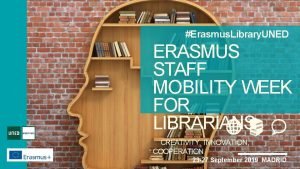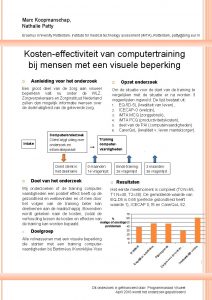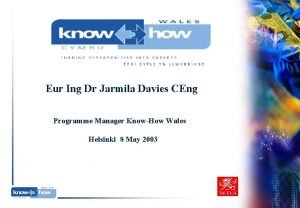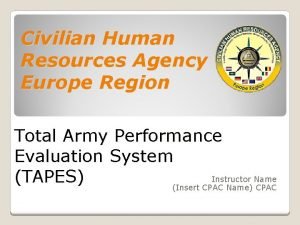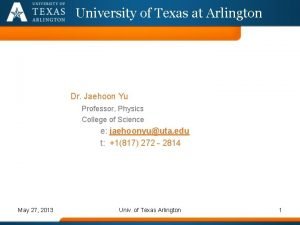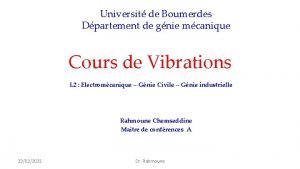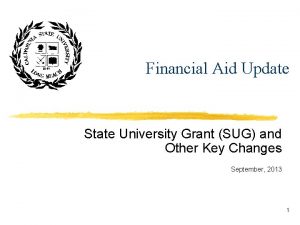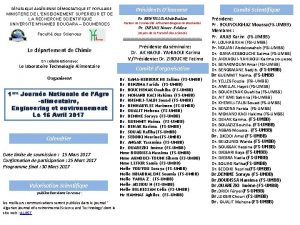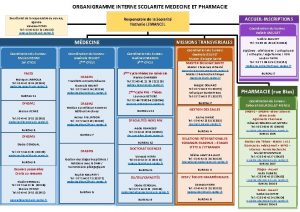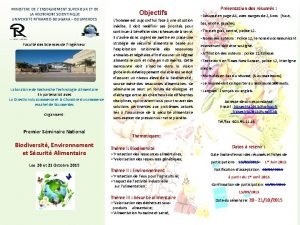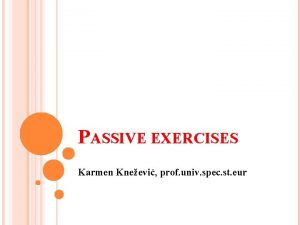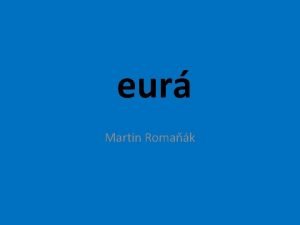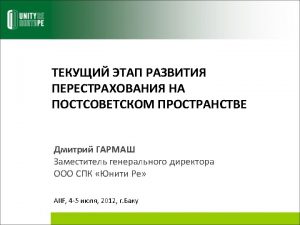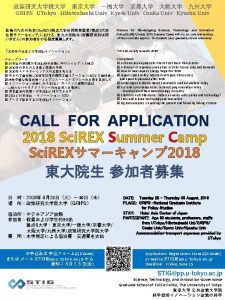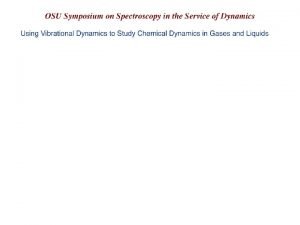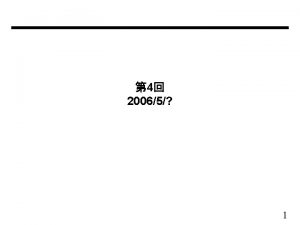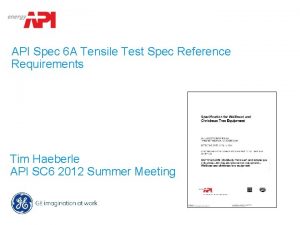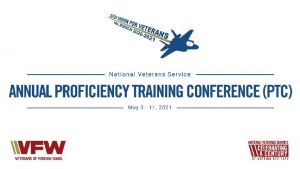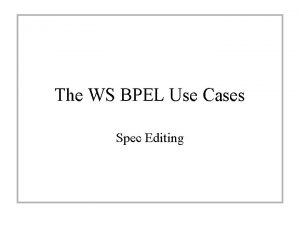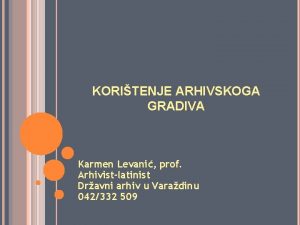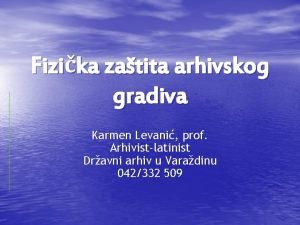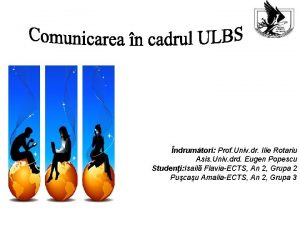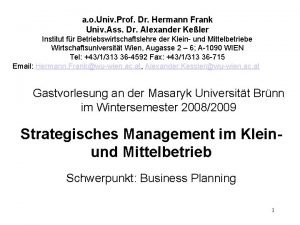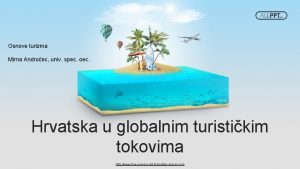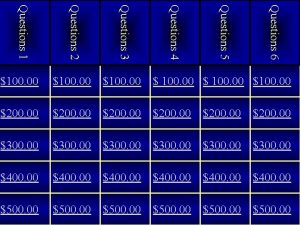Questions Karmen Kneevi prof univ spec st eur





























- Slides: 29

Questions Karmen Knežević, prof. univ. spec. st. eur

Yes/no question one that we can answer with yes or no Are you ready? – Yes, nearly. / No, I don’t think so. Have you seen my bag? – Yes, it’s on the chair. / No, I don’t think so.

Other uses… esp. with modal verbs (Shall we go then? > a suggestion Requesting > Can/could you write the address for me, please? Offering > Can I carry something for you? Inviting > Would you like to come to a party? Asking permission > May I use your phone?

Form*auxiliary verb – pomoćni glagol begins with an auxiliary verb ( a form of be or have or a modal verb, e. g. can, should) the auxiliary verb comes before the subject! Engl. aux. verbs => BE, DO, HAVE (+ modal verbs) Hrvatski pomoćni glagoli ?

Form - example STATEMENT: It is raining. QUESTION: Is it raining?

More auxiliaries… If there is more than one aux. verb, only the first one comes before the subject in a question: I have been working. > Have you been working? We could have done better. > Could we have done better?

Your turn – make questions! 6. He is a rich man. Nick has got a motor bike. I can help you with those bags. A mistake could have been made. Anna had been working all night. I will be studying this time tomorrow. 7. The letters have been posted. 1. 2. 3. 4. 5.

Wh- questions Begin with question words: who, what, which, whose, where, when, why, how question phrases: what time, what kind of/what sort of, how often, how long, how much/many, what color, how old, how far

Form Rule: a question word + an aux. verb + subject Why are you fighting? – For our freedom. When will the war be over? – Very soon

Further examples

More than one aux. verb… … only the first one comes before the subject! I should have said something. > What should I have said?

Your turn… 1. 2. 3. 4. 5. 6. The Greek flag is blue and white. There a hundred thousand centimeters in a kilometre. Sirius is a star. I’m carrying Judy’s bag. Our friends have gone to NYC. We had been talking about the wedding.

Prepositions in wh- questions e. g. You are looking for something. > What are you looking for? NOT For what are you looking? the preposition normally comes in the same place as in the statement (possible in more formal English: In which warehouse were the goods stored ? )

Your turn… 1. 2. 3. 4. 5. We are waiting for Rachel. Nick is laughing at one of Tom’s jokes. I am from Bombay. I am interested in a package holiday. I have been out with a friend.

Jednostavna glagolska vremena only one verb form in the statement (no auxiliary verb) two tenses: Present Simple, Past Simple The buses run every day. I liked the concert.

Which auxiliary? Use a form of DO ! DO or DOES in Present Simple DID in Past Simple

Present Simple – yes / no STATEMENT: Laura plays tennis every week. QUESTION: Does Laura play tennis every week? STATEMENT: We () play tennis every week. QUESTION: Do we play tennis every week?

Present Simple – wh- questions STATEMENT: She visits her parents once a month. QUESTION: How often does she visit her parents? STATEMENT: We () play tennis every week. QUESTION: How often do we play tennis?

Past Simple STATEMENT: He finished the painting. (regular verb) QUESTION: Did he finishØ the painting? STATEMENT: We sold our house a week ago. (irregular verb) QUESTION: When did we sellØ our house?

The procedure in steps… identify the tense (present or past) if wh- question, choose the appropriate question word choose the auxiliary (do, does or did) lose the ending (-s, -d/-ed, irregular verb) – the base form ! pass our quiz successfully ! let’s do it together…

The procedure… She speaks three foreign languages. present simple, 3. Ps. Sg. Question word + does + Subject + base form (infinitive) How many foreign languages does she speak?

The procedure… They bought a new house yesterday. past simple did, infinitive When did they buy a new house?

When do is the main verb… do can also be the main verb in the sentence you still need the auxiliary verb do He always does all the exercises. (main verb) Does he always do all the exercises? (auxiliary) (main)

TO BE If the main verb in the sentence is to be, do not use the aux. do INVERSION: change the place of the subject and the verb! I am ready. > Am I ready? / Are you ready? It was lonely without you. > Was it lonely without you / without me?

Exercises: yes/no questions � � � � � They usually catch the 8. 10 bus. These figures astonish me. We change planes at Heathrow. She uses a computer. Your child relies on you. Rubber balls bounce. He loves her. She carries a sleeping bag. She saw your mother. He looked at the picture.

Exercises: yes/no questions � They drank all the wine. � She thought about it. � She sold the car. � They were hurt in the accident. � She is very pretty. � Jack kept the money. � The police caught the thief. � The boys ran home. � He finished early. � They flew to New York.

Exercises: yes/no questions They did all their homework. Ann does my hair. His son wrote a novel. She did her best. Tom was sleepy. My mother chose this hotel.

� Exercises: wh- questions � The sun rose at six. � They spent $200. � Keiko taught Japanese. � She plays chess very well. � He misses his mother. � They box in the gymnasium. � Mary washes the floor every week. � You always carry an umbrella. � Buses pass my house every hour. � I met her on Tuesday.

Exercises: wh- questions � Tom likes football. � Elvis Presley died in 1977. � They told nothing. � I had breakfast at six. � Most children like ice cream. � The gates were open yesterday. � He takes the dog out twice a day. � I make cakes every week. � Martin does his homework in the afternoon. � I sent it to the laundry.
 Univ prof titel
Univ prof titel Karmen kokot
Karmen kokot Karmen toros
Karmen toros Koma reeglid
Koma reeglid Vukovar 1991
Vukovar 1991 Karmen novi svet
Karmen novi svet Sumeyraerkek
Sumeyraerkek Karmen palts
Karmen palts Caratteristiche neoclassicismo
Caratteristiche neoclassicismo Kneevi
Kneevi Kneevi
Kneevi Kneevi
Kneevi Kneevi
Kneevi Stubičasti dijagram
Stubičasti dijagram Kneevi
Kneevi Kneevi
Kneevi Otonska renesansa
Otonska renesansa Johan stranne
Johan stranne Chaarted
Chaarted My eur library
My eur library 5 bmg
5 bmg Eur ing vs ceng
Eur ing vs ceng Da form 7222
Da form 7222 Univ of texas arlington
Univ of texas arlington Faculté de médecine de constantine
Faculté de médecine de constantine Ch rahmoune
Ch rahmoune Sug grant
Sug grant Umbb inim
Umbb inim Scolarite medecine nantes
Scolarite medecine nantes Fs.univ.umbb
Fs.univ.umbb
